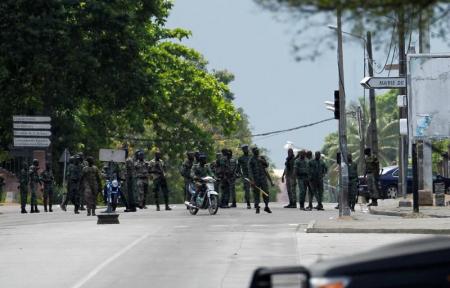At least five people were wounded by gunfire on Sunday during protests in Ivory Coast’s second-biggest city, Bouake, against an army mutiny, according to a witness, as popular opposition to the three-day nationwide revolt over bonuses gathered momentum.
Mutinous soldiers have now opened up access to the city, a leader of the uprising and Bouake residents said, allowing vehicles to move in and out for the first time since Friday.
The mutiny began in Bouake and spread quickly to other cities and towns, mirroring an uprising by the same group in January that paralysed parts of Ivory Coast.
The soldiers, most of them ex-rebel fighters who fought to bring President Alassane Ouattara to power, cut off access to Bouake, defying the army chief, who threatened severe punishment if they did not return to barracks.
The defence minister has vowed not to negotiate with the renegade troops.
Heavy gunfire erupted in Bouake’s city centre early on Sunday as the soldiers sought to disperse crowds of residents who were attempting to organise a march against the mutiny.
“The population rose up, but the mutineers quickly dispersed the march with shots,” said Bouake resident Simon Guede. “Everything is closed. No one is in the streets except the soldiers and a few protesters.”
A witness saw five people who had been brought to the city’s main hospital with bullet wounds following the aborted march. Two other protesters, who had been beaten, were also being treated.
Three people were shot and wounded by the mutineers on Saturday.
Sergeant Seydou Kone, a spokesman for the mutiny, confirmed to Reuters that the soldiers had dispersed the crowds on Sunday but said he was not aware of any injuries.
Similar rallies and marches were held in the cities of Korhogo and Daloa and in the commercial capital Abidjan on Saturday. More were expected on Sunday.
Under pressure from angry truck drivers and travellers, who have been unable to enter or leave Bouake since Friday, the mutineers began allowing traffic to circulate on Sunday morning.
“We have nothing against the population,” Kone said. “We just want our money. We will be here until the president pays us our money. We control the entrances to the city and we can close them whenever we want.”
Witnesses and a local lawmaker confirmed that vehicles were moving in an out of the city, which sits on the main road axis between Abidjan, the commercial capital – one of the region’s largest ports – and landlocked neighbours Mali and Burkina Faso.
Ivory Coast has emerged as one of the world’s fastest growing economies following a decade-long political crisis ended by a 2011 civil war. But deep divisions persist, particularly in a military assembled from former rebel and loyalist combatants.
Source: Reuters



